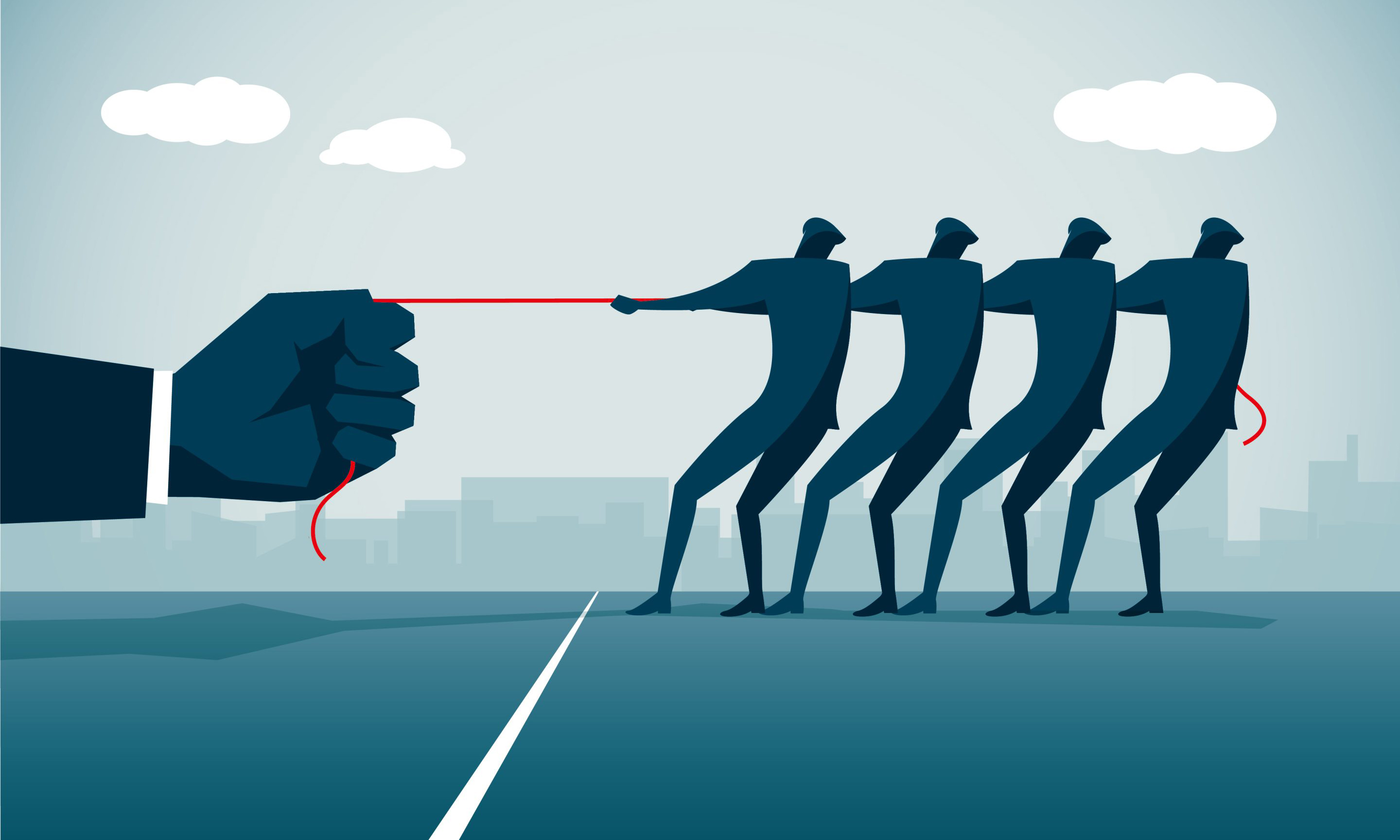
有关“社会主义”的讨论近来随处可见,或许我们也应该讨论讨论资本主义了。美国有许多人并不清楚什么是资本主义,也不知道它对我们产生了何种影响。资本主义绝不是一种完美的制度,但借用丘吉尔的话来说,至少,它不是最糟糕的。
“竞争”是资本主义最少被人提及、或许也最重要的要素之一。在体育运动中,我们赞颂竞争,并且会向获胜者表示祝贺。然而在商业世界中,竞争却几乎已经成了贬义词。由于“我们需要保护参与竞争的企业、使其免遭失败之苦”的想法逐渐深入人心,庆祝胜利似乎反倒成了一件令人不堪的事情。
但竞争总有获胜者和失败者,不是么?在当前这样一个关注平等和社会公正的时代,或许很难接受这一事实,但无论好坏,竞争都是经济成长的基础所在,而又是这种立足于创新和进步之上的经济成长,才让美国得以在当今世界扮演领导者的角色。社会公正看重的是民众,是要确保民众的权益得到保护。而企业监管则与之相反,侧重于保护竞争而非参与竞争的企业。
遗憾的是,现在许多成功者仅仅因为成功便被塑造成了反面角色,我们不仅不称赞他们取得的成功,反而将他们的成功视为对不那么成功企业的不公。
如果为了保护参与竞争的企业、使其免遭失败之苦,我们不惜妖魔化竞争中的获胜者,甚至通过限制对财产和合同权利的保护在其发展道路上设置障碍,那么从长远来看,我们都将吞下失败的苦果。
而且这种做法明显有悖常理。正如伟大的美国法官勒尼德·汉德所说:“我们不能因为竞争者在被卷入竞争大潮后取得成功而对其横加指责。”
问题无疑确实存在。有时成功者会认为成功是自己的权利,甚至可能会为保护这种成功而不择手段。但这种情况并不像有些人让我们相信的那样普遍,而且从长远来看,这种企图也终将以失败告终。根据熊彼特提出的“创造性颠覆”等概念,自满、高额利润和市场支配地位将必然导致新创新的出现,而这些创新则会取代市场现有的领导者。
不要只听我说,不妨看一下标准石油(Standard Oil)、美国钢铁公司(U.S. Steel)、联合鞋业公司(United Shoe)和IBM的经历。
当然,上述企业都曾经强盛一时,有些企业甚至因为涉嫌“非法垄断”而遭到反垄断起诉。但随着时间的推移,其中的大多数企业都已经风光不再,因为它们没有跟上需求的变化,没有跟上技术革新的脚步,在与更具创新能力、更自信的对手竞争时落在了下风。
更新的例子包括MySpace和雅虎(Yahoo),前者在Facebook(现已改名为Meta)出现前曾经被称为社交媒体领域的垄断企业,而后者也曾经被视为搜索领域的垄断者,直到被谷歌(Google)等公司提供的更具竞争力的产品所取代。不知道你是否还记得,华盛顿特区的大多数人曾经认为自己没有黑莓手机(Blackberry)就将无法正常工作,而欧洲人曾经把诺基亚(Nokia)当作手机的代名词。
我想表达的观点非常清楚,没有什么能够永垂不朽,包括那些似乎拥有压倒性市场优势的企业。待到更好的产品出现之后,这些企业和它们的优势都将不复存在。
巨大的错误?
现在,人们开始将关注的目光投向了那些在近年来积聚了巨大市场力量的“科技巨头”,为辩论出必须采取哪些措施对其加以控制,各方争得不可开交。而在美国国会方面,议员们也提出了众多反托拉斯法修改提案,目的则是更加积极地限制平台或看门人的权力。
我澄清一下,我不是在为这些公司辩护,我相信,我们有充分、有力的理由对这些公司的做法以及它们获取并维持自己主导地位的过程加以审查。
我也相信,它们与过去大多数所谓的“垄断企业”存在本质上的不同,这些科技巨头能够以更具侵入性的方式影响我们的生活,我们既是它们的客户,也是它们的原材料和产品。
我想说的是,我们应当认真思考解决的办法,当心“矫枉过正”,也就是说,在进行立法时,我们应当更加侧重于“具体行为”,而不是试图修改过去120年间经过众多先辈精心打造的垄断法律体系。对于那些想要立刻看到变化的人而言,这些体系无论如何都不可能令他们满意。
对现行法律进行重大修订必然产生意外后果,除此之外,司法机构为释读新的法律框架、判断其对此前判例的影响、再将其应用到特定案件之上,需要耗费大量时间,如此一来,想要快速修法充其量只能说是不切实际的幻想。
在仓促行动之前,我们需要进行深思熟虑的分析和讨论,包括重新将关注点放在自由市场体系的原则和政策之上,特别需要关注竞争的积极作用。自美国建国以来,正是竞争在促使我们不断进行发明和创新。这才是我们应该讨论的话题。(财富中文网)
唐·罗森伯格在高通(Qualcomm)工作14年后,近期刚从法律总顾问任上退休,此前他也曾经担任苹果(Apple)和IBM的法律总顾问。
译者:梁宇
审校:夏林
有关“社会主义”的讨论近来随处可见,或许我们也应该讨论讨论资本主义了。美国有许多人并不清楚什么是资本主义,也不知道它对我们产生了何种影响。资本主义绝不是一种完美的制度,但借用丘吉尔的话来说,至少,它不是最糟糕的。
“竞争”是资本主义最少被人提及、或许也最重要的要素之一。在体育运动中,我们赞颂竞争,并且会向获胜者表示祝贺。然而在商业世界中,竞争却几乎已经成了贬义词。由于“我们需要保护参与竞争的企业、使其免遭失败之苦”的想法逐渐深入人心,庆祝胜利似乎反倒成了一件令人不堪的事情。
但竞争总有获胜者和失败者,不是么?在当前这样一个关注平等和社会公正的时代,或许很难接受这一事实,但无论好坏,竞争都是经济成长的基础所在,而又是这种立足于创新和进步之上的经济成长,才让美国得以在当今世界扮演领导者的角色。社会公正看重的是民众,是要确保民众的权益得到保护。而企业监管则与之相反,侧重于保护竞争而非参与竞争的企业。
遗憾的是,现在许多成功者仅仅因为成功便被塑造成了反面角色,我们不仅不称赞他们取得的成功,反而将他们的成功视为对不那么成功企业的不公。
如果为了保护参与竞争的企业、使其免遭失败之苦,我们不惜妖魔化竞争中的获胜者,甚至通过限制对财产和合同权利的保护在其发展道路上设置障碍,那么从长远来看,我们都将吞下失败的苦果。
而且这种做法明显有悖常理。正如伟大的美国法官勒尼德·汉德所说:“我们不能因为竞争者在被卷入竞争大潮后取得成功而对其横加指责。”
问题无疑确实存在。有时成功者会认为成功是自己的权利,甚至可能会为保护这种成功而不择手段。但这种情况并不像有些人让我们相信的那样普遍,而且从长远来看,这种企图也终将以失败告终。根据熊彼特提出的“创造性颠覆”等概念,自满、高额利润和市场支配地位将必然导致新创新的出现,而这些创新则会取代市场现有的领导者。
不要只听我说,不妨看一下标准石油(Standard Oil)、美国钢铁公司(U.S. Steel)、联合鞋业公司(United Shoe)和IBM的经历。
当然,上述企业都曾经强盛一时,有些企业甚至因为涉嫌“非法垄断”而遭到反垄断起诉。但随着时间的推移,其中的大多数企业都已经风光不再,因为它们没有跟上需求的变化,没有跟上技术革新的脚步,在与更具创新能力、更自信的对手竞争时落在了下风。
更新的例子包括MySpace和雅虎(Yahoo),前者在Facebook(现已改名为Meta)出现前曾经被称为社交媒体领域的垄断企业,而后者也曾经被视为搜索领域的垄断者,直到被谷歌(Google)等公司提供的更具竞争力的产品所取代。不知道你是否还记得,华盛顿特区的大多数人曾经认为自己没有黑莓手机(Blackberry)就将无法正常工作,而欧洲人曾经把诺基亚(Nokia)当作手机的代名词。
我想表达的观点非常清楚,没有什么能够永垂不朽,包括那些似乎拥有压倒性市场优势的企业。待到更好的产品出现之后,这些企业和它们的优势都将不复存在。
巨大的错误?
现在,人们开始将关注的目光投向了那些在近年来积聚了巨大市场力量的“科技巨头”,为辩论出必须采取哪些措施对其加以控制,各方争得不可开交。而在美国国会方面,议员们也提出了众多反托拉斯法修改提案,目的则是更加积极地限制平台或看门人的权力。
我澄清一下,我不是在为这些公司辩护,我相信,我们有充分、有力的理由对这些公司的做法以及它们获取并维持自己主导地位的过程加以审查。
我也相信,它们与过去大多数所谓的“垄断企业”存在本质上的不同,这些科技巨头能够以更具侵入性的方式影响我们的生活,我们既是它们的客户,也是它们的原材料和产品。
我想说的是,我们应当认真思考解决的办法,当心“矫枉过正”,也就是说,在进行立法时,我们应当更加侧重于“具体行为”,而不是试图修改过去120年间经过众多先辈精心打造的垄断法律体系。对于那些想要立刻看到变化的人而言,这些体系无论如何都不可能令他们满意。
对现行法律进行重大修订必然产生意外后果,除此之外,司法机构为释读新的法律框架、判断其对此前判例的影响、再将其应用到特定案件之上,需要耗费大量时间,如此一来,想要快速修法充其量只能说是不切实际的幻想。
在仓促行动之前,我们需要进行深思熟虑的分析和讨论,包括重新将关注点放在自由市场体系的原则和政策之上,特别需要关注竞争的积极作用。自美国建国以来,正是竞争在促使我们不断进行发明和创新。这才是我们应该讨论的话题。(财富中文网)
唐·罗森伯格在高通(Qualcomm)工作14年后,近期刚从法律总顾问任上退休,此前他也曾经担任苹果(Apple)和IBM的法律总顾问。
译者:梁宇
审校:夏林
With all the recent talk about socialism these days, isn’t it time to have a conversation about capitalism? There are many in this country who don’t understand what that is or how it defines us. It’s not a perfect system. But, to borrow from Churchill, it’s the least worst.
One of the least discussed—and most important—aspects of capitalism is competition. In sports, we thrive on it and congratulate winners. In business it has become almost pejorative. We’re uncomfortable celebrating victory because we’ve come to believe that companies need to be protected from the possibility of losing.
But doesn’t competition always involve winners and losers? That may be hard to accept in an age where we’re properly focused on equality and social justice, but for better or worse, it is fundamental to the system of economic progress—built on innovation and improvement—that has brought the United States to the leadership position we hold today. Social justice properly focuses on people and ensuring their basic rights are protected. Regulation of business, in contrast, focuses on protecting competition, not competitors.
Unfortunately, the popular narrative now casts many winners as evildoers. Rather than laud achievements, we see success as unfair to those less successful.
If protecting competitors from losing means demonizing winners and putting obstacles in their path, through regulation or limiting protection of property and contract rights, then in the long run we will all lose.
And it’s counterintuitive. As the great American judge Learned Hand observed, “The successful competitor, having been urged to compete, cannot be turned upon when he wins.”
There is no doubt that problems exist. Success sometimes leads to a sense of entitlement, which in turn leads to abusive conduct aimed at protecting that success. But those instances are less common than some would have us believe, and in the long run do not work. The Schumpeterian notion of creative destruction, among other things, ensures that complacency, high profits, and market dominance will invariably lead to new innovation, which will displace the existing market leader.
Don’t take my word for it. What happened to Standard Oil? Or U.S. Steel? What about United Shoe? Or IBM?
All certainly were enormously powerful companies, and some were the subject of antitrust prosecution as illegal monopolies. But in time, most lost their power because they did not keep pace with changes in demand, with technology, or with more innovative and assertive competitors.
More recent examples are MySpace, which was said to have a monopoly on social media until Facebook entered the scene; or Yahoo, which was said to be a monopoly in search—until it wasn’t, due to competitive offerings like Google. Do you remember when most people in Washington, D.C., didn’t think they could function without their Blackberry, or when Europeans called their cell phone a Nokia?
The point is clear: Nothing lasts forever. That includes businesses with seemingly overwhelming marketplace advantages: Those advantages and those businesses only last until the next best thing comes along.
A big mistake?
Now there is new focus on “Big Tech” companies that have amassed enormous market power in recent years. The debate is raging about what must be done to rein them in. Numerous congressional proposals have been offered aimed at changing the antitrust laws, with the goal of more aggressively limiting the power of platforms or gatekeepers.
Let me be clear: I am not defending these companies. I believe there are good and valid reasons to examine their practices and the processes by which they attained and then maintained their positions.
I also believe they are in a different category than most alleged monopolies of the past, because they influence our lives in much more intrusive ways. We are their raw material, their product and their customer.
What I am saying is we should think hard about solutions. We should be careful that we don’t use a cleaver when a scalpel will do. This may mean legislative initiatives that are more focused on the particular practices of concern and less about trying to modify an antitrust jurisprudence that has been carefully developed over the last 120 years—and which, in any case, would not satisfy those who want to see immediate change.
Aside from the unintended consequences that inevitably result from major revisions to existing law, the length of time it would take for the judiciary to interpret a new statutory framework, determine its impact on previously established precedent and then apply it to any particular set of facts, will make any notion of a quick fix illusory at best.
What is required is thoughtful analysis and discussion before taking precipitous action. This includes a refocus on the principles and policies of a free market system, especially on the role of competition as a force for good—which, since our founding, has fueled innovation and invention. Let’s have that conversation.
Don Rosenberg recently retired after 14 years as general counsel of Qualcomm. He previously was general counsel at Apple and IBM.






